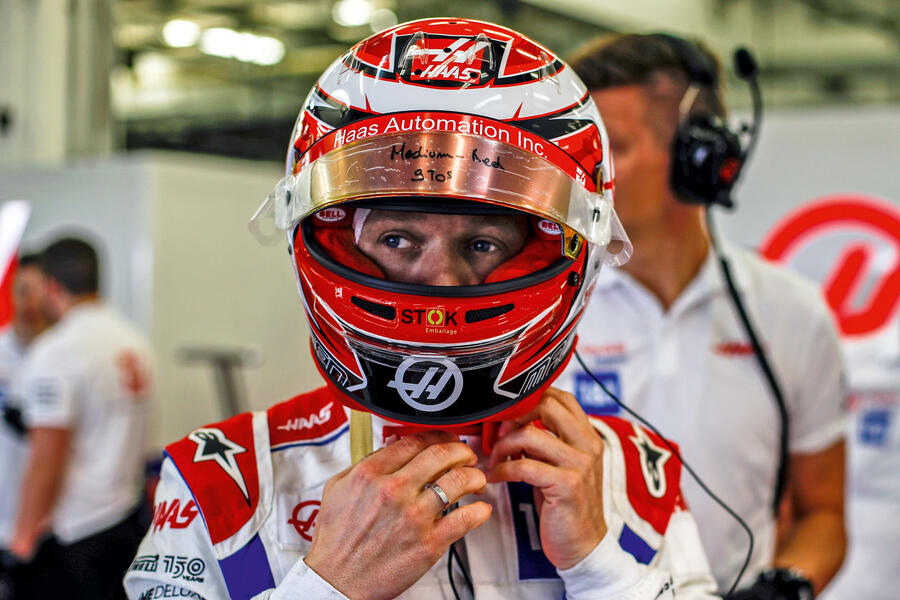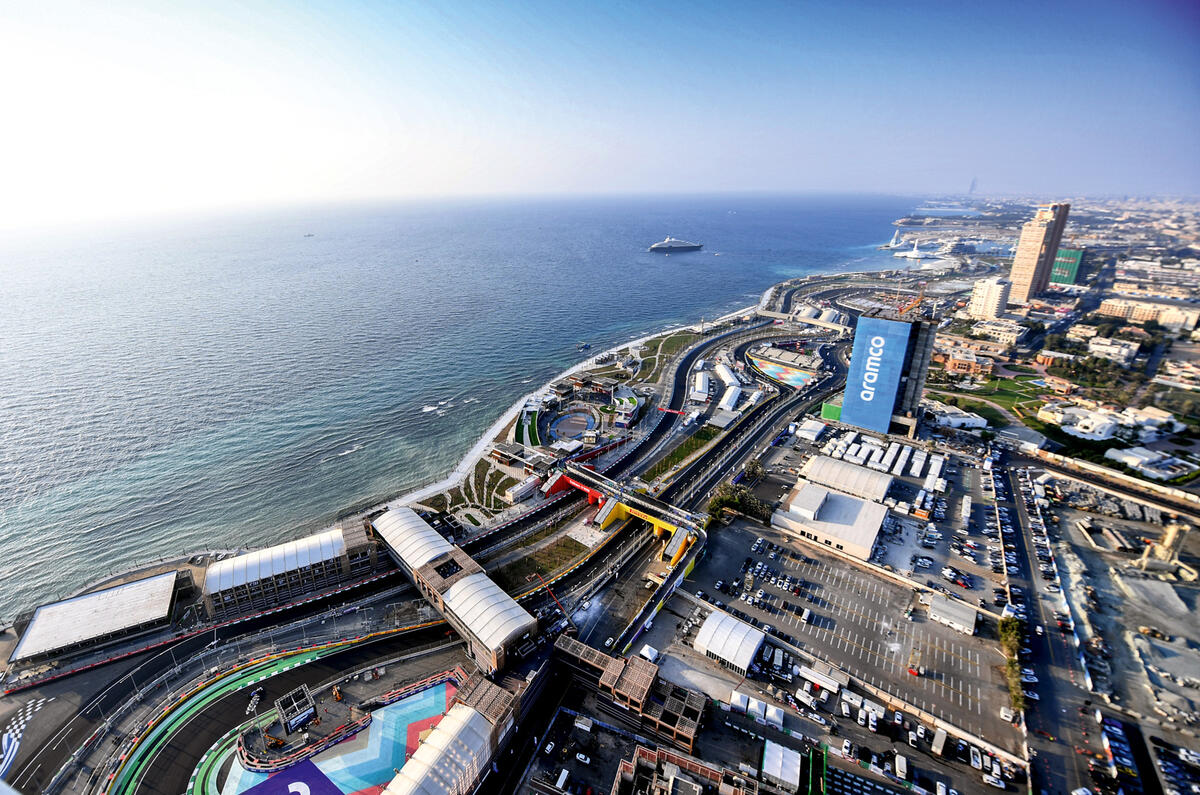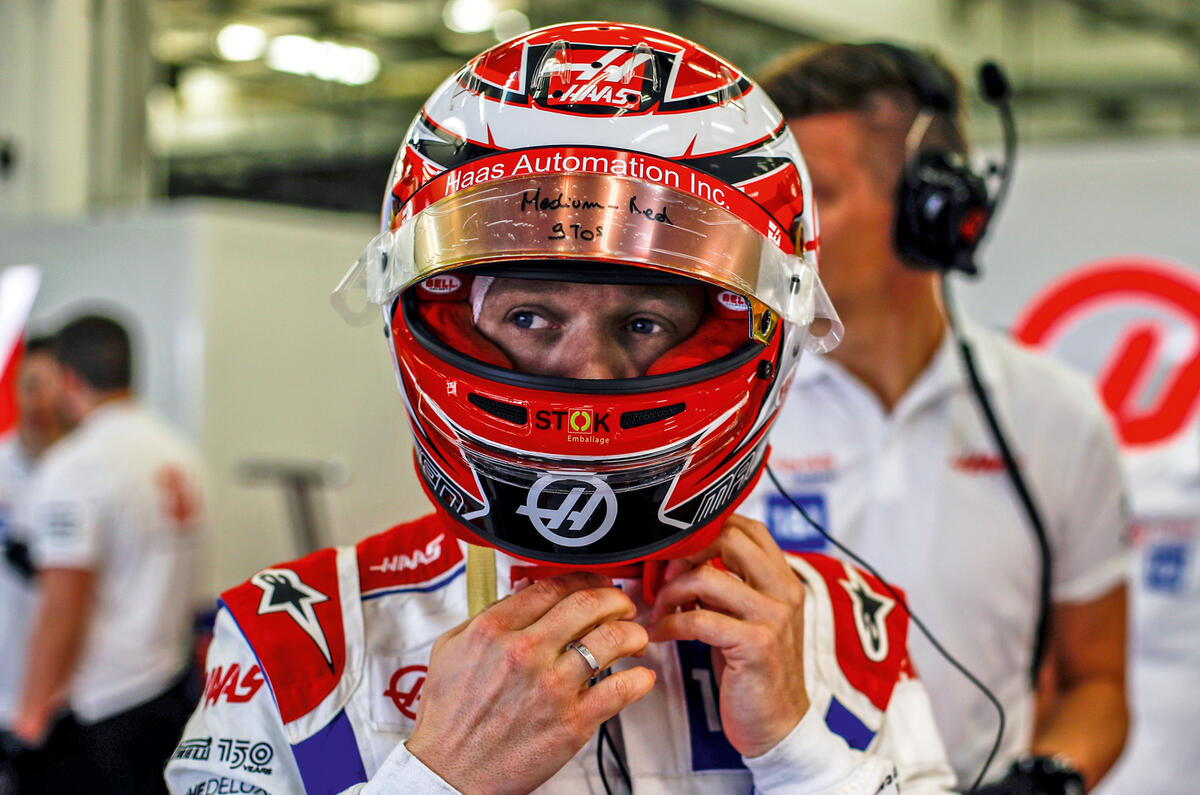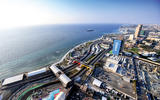Direct from the Bahrain season opener, Formula 1 heads to Jeddah this weekend for the second Saudi Arabian Grand Prix to run in less than four months. Come Sunday, that will be five consecutive races in the Middle East – certainly a first. It’s a sign of the times.
The new F1 season is framed, like everything right now, within the bigger picture of the appalling atrocities taking place in Ukraine. In that context, the timing of the race in Saudi should be considered awkward – but it probably won’t be for a sport that has a long history of turning a blind eye to where it travels versus troublesome real-world politics.
Even F1 couldn’t ignore Russia’s invasion of Ukraine, of course, and moved swiftly to cancel the Russian GP, while the American Haas team cut loose driver Nikita Mazepin and the backing that came with him from Uralkali, the company owned by his father Dmitry, who has close ties to Russian president Vladimir Putin.
For Gene Haas, these were commendably decisive actions that represented a significant financial blow to his team. Then again, it was also the only decision that he could take, and the same is emphatically the case for F1 and its lucrative links with Russia. There can be no credit for a call that it simply had to make.
Political moves
Now F1 heads for Saudi, a kingdom that’s indirectly caught in the web created by Putin’s war, due to its closed-ears response to American calls for assistance in the growing fuel supply crisis. With relations between the nations at an all-time low, US president Joe Biden having described the Arabian state in 2019 as a “pariah”, crown prince Mohammed bin Salman has been cool to requests for Saudi to pump more oil as the West struggles to wean itself off Russian supplies.
In a sport that literally and figuratively runs on the black stuff (Saudi state-owned Aramco, the world’s second-largest oil producer, is a big F1 sponsor), running a frivolous race on the streets of Jeddah right now almost seems obscene.
The Saudi stance could be translated as indifference towards Putin’s actions, were the nation not among the 141 that voted within the United Nations to condemn Russia’s actions. But I wonder whether F1 would have raced in Jeddah had Saudi voted against the resolution. That would have been a tester. And what if it had been among the 35 countries that chose to abstain, as China was?
The Chinese GP dropped off the calendar during the pandemic and has yet to return. Just as well for the sake of F1 and motorsport governing body the FIA: it’s a sticky decision that they don’t have to face.
Walking a fine line
But in June, F1 will travel to race in Azerbaijan, one of 12 countries that didn’t register a vote on the UN resolution. The oil-rich Eurasian nation is in a tough diplomatic spot, given its links to both Russia and Ukraine, so it’s hardly a surprise to find it sitting on the fence.
But in a crisis viewed by the West through a black and white prism of right versus wrong, good versus evil, can F1 really justify racing in a nation that hasn’t clearly and irrevocably condemned Putin’s actions? Neutrality just doesn’t wash in the world we live in today.
F1 has often walked a fine line on who it does business with. Remember Bernie Ecclestone cosying up to Putin at the first Sochi race in 2013? Not the ex-F1 boss’s finest moment – but hey, like Adolf Hitler, Russia’s dictator “gets things done”.
But post-Ecclestone, is F1 really so different? Just this month, Saudi Arabia conducted the largest mass execution in its modern history, putting to death 81 convicts. A pleasure to do business…
Then ahead of the Bahrain GP, F1 faced new allegations of ignoring human rights abuses. The Bahrain Institute for Rights and Democracy claimed that F1 has “abandoned those who have been tortured and imprisoned” following a fresh 15-year deal to keep the Sakhir circuit on its schedule.
long since refuted such accusations, existing as they do in their own self-serving bubbles of neutrality. After all, sport and politics, they should never be mixed… Should they? It’s all so much more convenient that way.
Good week

Kevin Magnussen: In the build-up to Bahrain, the Dane should have been prepping for the Sebring 12 Hours. Instead, he found himself drafted back to Formula 1 and Haas, in place of the exiled Russian Nikita Mazepin. You just never know in this game.
Bad week
Le Mans fans: The Le Mans 24 Hours will still be special this year, of course it will. But Peugeot’s call that it’s not yet ready to race the stunning 9X8 in the ‘big one’ is a bit of a blow to fans hoping for a challenge to Toyota. It always was a tall order for this year anyway.







Join the debate
Add your comment
Sadly the money is too high to ignore. Stories of a $950 million contract for Saudi over the contract term, plus $450 million Aramco F1 sponsorship trackside. Then add them "convincing" the drivers to stay on after a petro plant was attacked nearby by a bloody missile and drones on Friday... is there anything that money can't buy in F1? Seems like Duty of Care doesn't exist for British F1 teams?
Stinks to high heaven, and Middle East countries are ruining sport with the money being poured in - sports washing and attempts to remain relevant in the world when fossil fuels are phased out. And F1 having so many races in this medieval area of the world with regards to human rights.... Stinks.
The Saudi track is going to create a racing tragedy if they don't change it. Mick was lucky, and several hobbled cars coasting along the track today could have been collected by a flat out car on another day - wake up F1, it's as obvious as having heavy plant on the track to remove cars that led to Jules Bianchi's death as an issue to me. It's an exciting track, but I don't want a driver to die for my entertainment.
On a positive note - fabulous racing so far this year. Seems like Max has been made to race fairly this year, so first two races have been epic battles between Charles and Max.
Sky Director did his/her best to screw it up today - battle was raging on live in the last few laps while they showed slow motion replay after replay, when we wanted to see the bloody live action. Think I know the job Massi moved to now...
Now if someone can just hide the keys to Latifi's car each race weekend we'd also have uninterrupted races, rather than 15 mins of clearing up his latest prang. He does seem incapable of staying out of the walls...
You also have to consider this, it was described as " The Golden handshake contract " whereby each successive year was worth more than $40 million Dollars, now, I don't know about you, but I can't for the life of me see how a person is worth that ?, ok, your not going to turn it down if your offered it, but, where does that money get earned to pay that person?, and if you knew what the other teams pay there drivers, it could be said that current F1 is as good as it could be.
You forgot to metion that Saudi Arabia is currently attacking and destroying Yemen, with 300,000+ deaths so far, with the UK and US as the main sponsors.